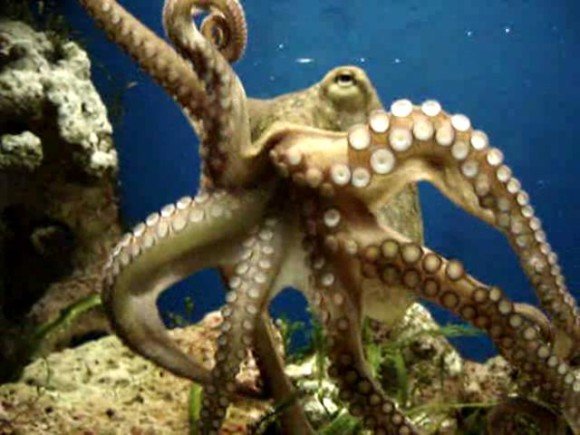Don’t Eat That: Octopus and Other Bizarre Foods
The octopus is an intriguing creature of the seas that derives its name from a Greek word which means eight-footed.
They are found in various parts of the oceans, most commonly in the coral reefs. Octopuses, some 300 species of which inhabit tropical waters around the world, can change colors, squirt out poison, and exert a force greater than their own body weight.
We like to believe that we’re the smartest creatures on the planet. But the more we understand octopuses, the more it seems that we may not be alone in our ability to solve problems, make complex connections between ideas, and survive by wits alone.
Scientists have found that octopuses can navigate their way through mazes, solve problems quickly and remember those solutions, at least for the short term. A growing body of evidence suggests that octopuses show elements of human-like intelligence. But their intelligence has evolved for very different reasons than ours did, which makes them particularly difficult to understand.
Octopuses are preyed upon by sharks, dolphins, morays and conger eels.
But by far the biggest threat to octopuses (as well as other sea creatures) are humans.
All octopus species are suffering from overfishing, with no fishery management and dwindling numbers. They are also caught in large numbers as bykill with long line and other fishing methods.
Bizarre Foods Featuring Octopus
In case you don’t know, Bizarre Foods with Andrew Zimmern is a documentary-styled travel and cuisine television show hosted by Andrew Zimmern on the Travel Channel.
I don’t watch the show, but it does present some truly bizarre food choices “Bizarre Foods focuses on regional cuisine from around the world which is typically perceived by Americans as being disgusting, exotic, or bizarre.
In each episode, Zimmern focuses on the cuisine of a particular country or region. He typically shows how the food is procured, where it is served, and, usually without hesitation, eats it. You can find a whole list of the episodes and foods on wikipedia.
While the chef is enjoying celebrity status and a highly-coveted spot on prime-time television, here is a point of view that describes it for what his show really is: mindless, heartless entertainment “essentially sensationalizing the gruesome, medieval act of torturing, slaughtering, and eating creatures that, if they had a choice, would certainly run, fly, or swim in the other direction—away from this predator.”
Here is the excerpt from the Comfortably Unaware blog:
Andrew begins by walking into a crowded, noisy restaurant in Japan sitting down between two people on a stool at a counter—behind which, the cooking is accomplished for all to see. Zimmern states that this is why he “loves restaurants in Japan” because of “their noise and also freshness of seafood.” The camera then, on cue from the “freshness” comment, turns to capture the chef pulling an octopus out of a pan on the floor.
The octopus was, of course, very “fresh” and very alive as it gracefully and purposefully moved the tips of its eight legs, gently up and down the chef’s hands and arms as the animal tried to assimilate textures, colors, and temperatures, attempting to make sense out of its new surroundings. That’s what octopuses (or octopi) do.
They are quite intelligent beings with a large cognitive brain and complex sensory input mechanisms that researchers have recently found to be able to problem solve. They can gather information, process it, and then implement well thought out functions. Female octopuses are very sensitive with a strong maternal instinct—so strong that they mandatorily give up their life in the process of having offspring and protecting them after birth.
The Bizarre Foods’ camera crew then moved back to Zimmern. The person sitting in the next stool put her hand on his baldhead and said “the octopus has a head like yours”, referring to Zimmern’s shiny, hairless scalp. A good laugh ensued while the camera focused on the chef pushing the octopus down with both his hands into a pot of boiling oil over a red-hot burner in order to kill and cook the poor unsuspecting octopus.
We weren’t allowed to see how the octopus reacted to being held in oil as it was being boiled to death—portions to be then later served for Zimmern to eat. Imagine, for just a moment, what that octopus must have experienced as it went from attempting to carefully feel, see, interpret, and adapt to the chef’s hands with the thousands of sensory receptors on its legs—sending those inputs to an intelligent and quickly processing brain—to the next moment of being forcefully held in boiling oil, scalded to death. Actually, you can’t really imagine it, because you are not an octopus.
Although we are still learning about octopuses, (while killing 2.5 million tons of them and other cephalopods such as squid each year) it is has been quite well established that they are very sentient beings that feel and think in ways we do not understand. It can also be said that like all animals, octopuses only eat what they need to in order to survive. They kill only because they NEED to and without knowing that they are inflicting pain or suffering on any other living thing—quite unlike Andrew Zimmern and 98% of all other humans on this planet who kill because they WANT to kill, and then eat whatever it was that they just killed. All this, for no nutritional reason (there are many plant based foods that are infinitely healthier for us to consume). So, no, the person sitting next to Zimmern was not correct with her comment to him. The octopus does NOT have a “head” like his.
Bizarre Foods, Andrew Zimmern, and the Head of an Octopus

Questions? Comments? Suggestions?
If you have a favorite recipe, why not submit it here in the comment section of this smoothie recipes blog for others to enjoy too!
I also welcome any comments, questions and suggestions. Thanks!
